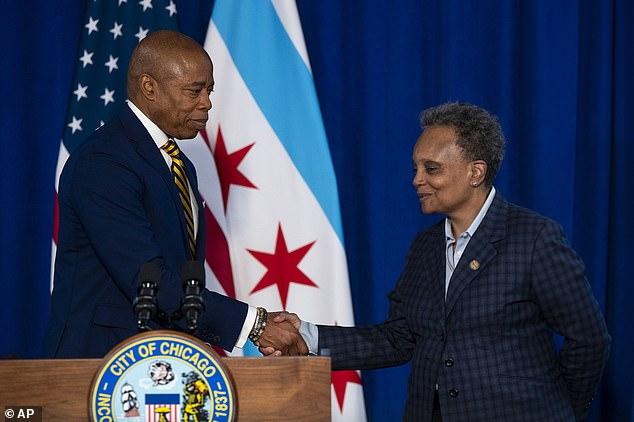The mayors of New York City and Chicago met Friday to discuss strategies on how to combat a violent crime wave as criminality continues to impact daily life in both cities.
Friday marked the first visit to Chicago for New York City Mayor Eric Adams. He met with his counterpart, Mayor Lori Lightfoot for just under an hour at Chicago's City Hall.
"We both recognize that cities are really where things are happening," Lightfoot told reporters during a joint news conference. "We are the cultural, social, public policy laboratories across the country as well as driving this nation's economic recovery."
NYPD DEPLOYS NEIGHBORHOOD SAFETY TEAMS TO COMBAT RISING GUN VIOLENCE IN NEW YORK CITY
Both cities continue to struggle to fight the crime wave that began amid the COVID-19 pandemic while also filling vacancies in their respective police forces.

Adams, a former police officer, unveiled his ‘crime-fighting plan dubbed the "Blueprint to End Gun Violence" in January. The plan includes more police officers on the streets and bringing back the NYPD's controversial anti-crime street unit, which was comprised of plainclothes officers who focused on getting guns off the streets.
The mayor has frequently railed against the pipeline of guns that flows into large cities, and specifically, disadvantaged communities.
"We have to turn off the faucet that is continually feeding the river of violence in our cities," Adams said Friday. "There's a tint of racism to this. We don't manufacture guns in Chicago but why are we able to remove 12,000 guns off the street? Where are they coming from?
"America's failure to define crisis, anything that happens outside of the Black and brown communities is defined as a crisis," he added. "This is a crisis that we have been facing historically and it has been limited to certain geographical areas of our cities and our country."
Both mayors called for help from the federal government and for more resources to tackle crime prevention and intervention.
They didn't discuss anything specific with regard to policy.
"We talked mostly about the things we are doing about the immediate, intermediate and the long term to really deal with these generational crisis' of public safety in far too many neighborhoods in our respective cities," Lightfoot said.









